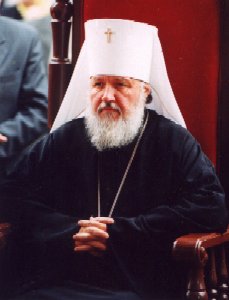“The day of the meeting of the Lord”. Address by Metropolitan Kirill of Smolensk and Kaliningrad, chairman of the Moscow Patriarchate Department for External Church Relations, to the readers of Kommersant
12.03.2003 · English
THE DAY OF THE MEETING OF THE LORD
Address by Metropolitan Kirill of Smolensk and Kaliningrad, chairman of the Moscow Patriarchate Department for External Church Relations, to the readers of Kommersant
(“Kommersant”, February 2003)
“Hail, O Virgin Birth-giver of God: for from you has shone forth the Sun of Righteousness, Christ our God, who gives light to those who are in darkness, And rejoice, you aged, righteous man, who did receive in your arms the Redeemer of our souls, who gives us resurrection”, exclaims the Church on the Day of the Meeting of the Lord.
“Sreteniye” in Slavonic means meeting, and on this day we make a mental journey to the temple in Jerusalem to which the Holy Family brought the Enfant Jesus over two thousand years ago to “present him to the Lord”, as St. Luke testifies. There was in the temple a righteous old man called Simeon, who took the divine Infant in his arms and suddenly uttered the striking words which are so important that they are repeated during every vespers in the Orthodox Church even today: “Sovereign Lord, as you have promised, you now dismiss your servant in peace. For my eyes have seen your salvation, which you have prepared in the sight of all people, a light for revelation to the Gentiles and for glory to your people Israel” (Lk. 2:29-32). A meeting takes place between God and not only Simeon but in his person all those who lived in hope for salvation, hope for the coming of the Messiah. Many thousand years should have passed so that this meeting could become a reality, and the believing heart waited with trepidation for the promise to be fulfilled. The Old Testament with its domination of law fades into the background to be replaced by the New Testament with its principal commandments of love and mercy. Salvation ceases to be only an aspiration, for henceforth all people of faith can see that the Divine Infant is the One Who gives help. By his wondrous spiritual insight, Simeon lets us see something very important in relations between God and humanity: grace and salvation may belong only to that heart which is always turned in prayer and deed to the Creator of times and which knows that in the hardest times God is at its side however impossible it may seem.
Such attitude to God and the world is very hard to cultivate in oneself, but this is the way towards the knowledge of the truth, for only in this way salvation will no longer be understood as receiving from God a possibility of heavenly life automatically, but as a gift of Christ to the soul sincerely open to Him.
The experience of atheistic non-existence shows how deep can be an abyss of moral vacuum devoid of the slightest sign of society’s being turned to the Most High. If the old man Simeon, and dozens and thousands prophets, righteous men and simply devout people with him, lived in the hope of a joyful meeting with the Lord and this hope was for them more solid than any reality, the recent past was characterized with precisely the opposite, the muteness of no expectation of meeting the Lord. Therefore, when we speak about the revival of the Russian Church, we bear witness to the One Who “is destined to cause the falling and rising of many … and to be a sign that will be spoken against”, and pray that hope may revive in society and that the happiness of a joyful talk with the Saviour may be again renewed in us.
See also:

